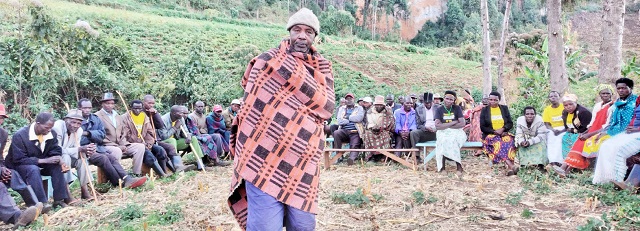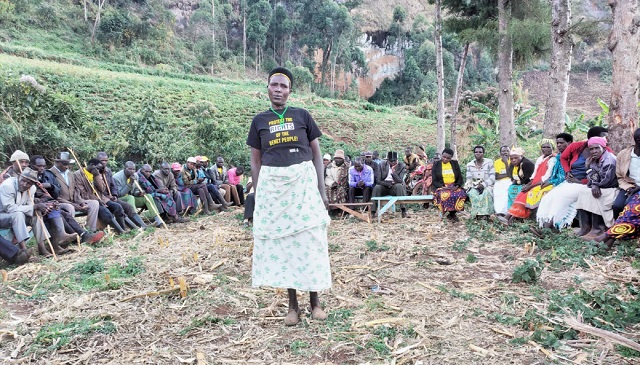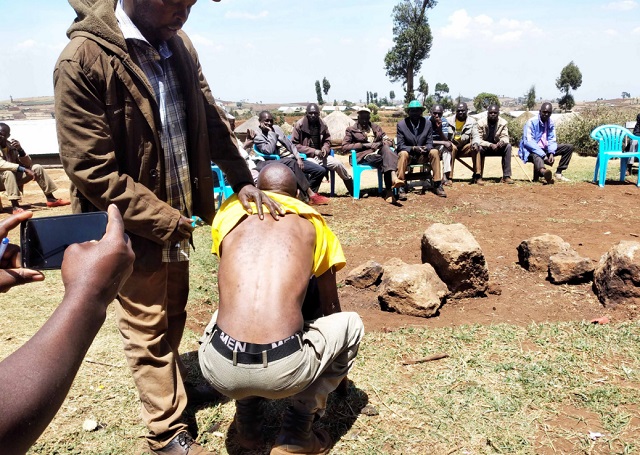
Why indigenous group is still struggling to shake off a 100 year-old British injustice
Kampala, Uganda | RONALD MUSOKE | Francis Cheptoek, 71, is one of the prominent elders of the indigenous Benet community from Kabarak, a village perched on the contoured northern slopes of Mt. Elgon in Kween District in eastern Uganda.
For the past couple of decades, he and his members have tried to fight for their land rights and identity as indigenous citizens of Uganda— sometimes pitting themselves against the government. But like thousands of other Benet, Cheptoek says he is frustrated.
“Had you found us in our ancestral home (forested zone of Mt. Elgon), we would have slaughtered a cow, eaten it and washed it down our throats with honey harvested from our forests,” he told The Independent on Feb.10 during a visit to the community organized by the Minority Rights Group, a London-based human rights organization that works to secure rights of ethnic groups including indigenous people around the world.
“We used to eat honey and drink milk. Our pregnant women ate the Kasmoyik wild fruit and gave birth with ease. But life is hard for us right now,” he added.
Cheptoek is not the only elder who spends time reminiscing about the good old days when life seemed relatively easy for the hitherto pastoral forest-dwelling indigenous community.
Kokop (grandmother) Samale, 59, from Kortow, a nearby village in Benet Sub-County in Kween also remembers her people having easier access to food and clean water.
But Violet Chemutai’s concern is the violent confrontations her community faces at the hands of Uganda Wild Authority (UWA) rangers almost on a daily basis. She claims sexual molestation of women who go to the forest inside the park to fetch firewood.
“Our children do not have peace. We are told that we smell donkey dung. It’s like we appeared from nowhere; it’s like the Benet were born to wild animals,” she said.
Taison Kapungus, a resident of Kortow said his community has no schools. He says when it rains, children especially those aged six and 10 face a lot of difficulty in accessing education. He said the nearest schools are located at least 20km away from their homes.
And for those who persevere and go on to secondary and other higher institutions of learning, there are other hurdles to contend with. Kapungus shares a disturbing experience about his daughter who recently quit school and settled for marriage.
“She was at Kwosir S.S and had reached Form 4 but her colleagues kept taunting her. They told her that even if she continued studying, there would be no job for her anyway, because she is Benet.”
For Kokop Sarah, 66, her worry is the community’s lack of a proper health facility. She says it is common for expectant Benet women to die on the way to hospital. For those who manage to reach hospital, communication is a problem because the women hardly understand what the nurses tell them. Most of the Benet women can neither read nor write, she says.
Kokop Vicky, 52, says the Benet have had “issues” from the time massive evictions were done by the government almost 40 years ago.
For Kokop Chemos, it is the 1990 incident that is still fresh in her memory. She says when the armed forces descended upon their villages and burnt people’s houses, the Benet were left with “mental scars.” “We lost everything and became confused. We now wonder whether we are part of this country or not.”

Distinct from Sabiny
The Benet say they are actually known as the Mosopishiek and they speak a language called Kumosop. But they are also derogatorily called “Ndorobo”—meaning “primitive people of the mountains.”
David Chemutai, the coordinator of the Benet-Mosop Community Association, a local lobby group told The Independent in a separate interview that the Benet or Mosopishiek share “a few things” with their more dominant Sabiny but they are a distinct ethnic grouping. He says they are part of the larger Kalenjin ethnic group found in both Uganda and Kenya.
Chemutai told The Independent that, for hundreds of years, his forefathers had lived peacefully in the forested higher altitude zone of Mt. Elgon. The entire forest and its moorland belonged to them.
He said even before the British colonialists drew boundaries separating what is now known as Kenya and Uganda, the Benet were dwelling in the caves that dot this dormant volcanic mountain. This is where most of their ancestors are buried.
Chemutai said his people were cattle keepers who used to roam the Mt Elgon moorlands in search of pasture. They reared cattle, sheep and goats but were more passionate about their cows.
“They also gathered fruits and harvested honey for their subsistence,” he said, adding that occasionally, the Benet women would exchange handicrafts for food (maize and millet) with the Sabiny people of the lowlands.
Chemutai said their territorial range stretched from River Sironko in the west of this mountain and they would move eastwards across the River Suam into Kenya. It is here that they would then cross the Lwakhakha River back into Uganda and graze their livestock as far as the Manafwa River.
The British Curse
But the fate of their ancestral land changed when the British colonial government declared the Mt. Elgon forest a reserve in the 1920s. Since then, a series of events have gradually reduced the rights over their own land.
First, a boundary was drawn by the colonial government in 1937 demarcating where the Benet would go and where they would not go. Many were pushed out of the now protected forest although some of the families were left to live inside the reserve because their numbers were considered insignificant to endanger the mountain ecosystem.
But when the Benet shifted to agriculture between the 1950s and 1970s from their traditional livelihoods of hunting, wild plant gathering and pastoralism, the government saw a window to take action.
And in 1972, the Benet community was declared “encroachers” by government. Feeling aggrieved, 20 Benet mobilized through a pressure group—the Benet Lobby Group—demanding redress.
In 1973, the government set aside part of the forest land for resettlement of the Benet and asked them to move over a ten-year grace period and by 1982, preparations for the resettlement exercise by the Forest Department had started.
In 1983, a land allocation committee was constituted and 6,000 hectares of land was taken from the forest reserve to resettle the Benet. However, the land allocation committee did not have sophisticated technology and decided to use natural features such as cliffs, streams, valleys and rivers to mark boundaries of the resettlement land. They ended up carving and sharing 7,500 hectares.
By 1984, over 2,800 Benet families had been resettled. But not everyone moved. Others remained behind because they did not want to lose their ancestral land.
Meanwhile, in 1989, Mt. Elgon Forest Reserve had been elevated to the status of a forest park and park authorities tightened their vigilance on hunting, grazing and agricultural activities by the Benet. Four years later, in October 1993, the government declared Mt.Elgon, a national park and officially resurveyed the 6,000 hectares.
Currently, the Mt. Elgon National Park is about 127,900ha in size and this includes the 49,382.9 ha forest that the Benet community still claim is their ancestral land.
But, Chemutai says, although their ancestral land stretches from River Kere in Bukwo District to River Kaptokwoi towards Kapchorwa, they have been squeezed onto smaller plots farther down the mountain—land which is still contested.

Fraudulent land compensation
He says only about 20% of the 20,000 Benet have benefitted from the government’s resettlement plan. The rest of the beneficiaries, who Chemutai says are Sabiny, were never part of the list of beneficiaries.
“These are some of the reasons why the Benet community keeps going back to their ancestral land,” says Alex Yesio, the chairman of the Benet-Mosop Community Association, a recently founded pressure group. “It is because the government has failed to find a long lasting solution for them.”
The indigenous community says the land compensation scheme was fraught with problems with thousands of families missing out on the compensation. Frustrated, some members of the Benet went back to resettle in the forest reserve insisting this was their ancestral land.
This threat of eviction prompted the community with the support of two NGOs, Action Aid Uganda and the Uganda Land Alliance, to bring a case against the Uganda Wildlife Authority and the Attorney General seeking for the Benet’s right to retain ownership of the 1,500 hectares which UWA said was part of the park.
This resulted into a ruling in favour of the community in a consent order and decree dated 27 October 2005. But the court order was never implemented.
Instead, in February 2008, the Benet people from the Yatui area were violently evicted by the Uganda Wildlife Authority. The community had to take refuge with relatives, or find shelter in caves or tree sheds as they waited for temporary allocation of land in Kisito, Kwosir Sub-County in Kween District.
Still, the Benet say the ‘temporary’ land allocation process was riddled with bureaucracy, unfairness and corruption, with some community members bribing local government officials to get the land they needed. Although the people who were temporarily resettled here were supposed to stay for six months, hundreds of them are still living there in deplorable conditions.
Meeting with Museveni
Unsatisfied with their condition, on Feb. 05, 2011, a Benet delegation met President Yoweri Museveni at his country home in Rwakitura seeking audience with him. They recounted their decades-long suffering. Museveni then directed the concerned ministries including the Office of the Prime Minister to de-gazette a portion of the national park so that some Benet families get resettled permanently.
In compensation, the communities were to receive building and planting materials and improved livestock for re-stocking.The possibility of allowing the community to sustainably graze in the moorland was also supposed to be considered and the resettlement was supposed to start immediately. However, nothing happened.
On April 11, 2016, another presidential directive was issued on the same subject. “The Benet should settle in the moorland permanently on condition that no illegal activities are carried out on the said land such as cultivation, deforestation and poaching. The perimeter is between Chepukut and Rwobok rivers, the remaining parts should be for the national park.”
Museveni’s directive added: “I am directing that no any authority should disturb the community anymore and I am told that the community used to respect the forest but they changed and resorted to poaching so they should be sensitized about it.”
In 2017, Dr. Ruhakana Rugunda, the immediate former Prime Minister told NTV, a local broadcaster, that it is true some of the people who were involved in allocating land to the Benet community gave themselves huge chunks of land and did not give adequate proportions of land to the people who deserved the land. But, five years after Rugunda’s visit, the Benet are yet to get their land.
False conservation narrative
Left with far fewer options, the Benet community keeps returning to their ancestral land, with UWA rangers resorting to force to evict them.
The community accuses UWA rangers of killings, unlawful use of force and firearms, including shootings, beatings and even crimes under international law, including rape, torture and other cruel, inhuman and degrading treatment.
Civil society organizations say the denial of the Benet people’s access to their land despite numerous cases demonstrating the legitimacy of their claim has been the motive towards the community’s incessant drive to claim what is rightfully their own.
Eunice Olembo, the Africa Legal Officer at Minority Rights Group International recently told The Independent that “the Benet community deserve better from the government.”
“The government in the past degazetted 6,000 hectares of land. This degazetting of land had issues. The process was unfair. The government officials distributed land to people from other communities and the Benet lost out in a process that was meant to benefit them,” she said.
“It may not be realistic to think that all the Benet can be resettled in the entire forest. Therefore, the government needs to find extra land to re-settle those that are in dire need of land. This should be done with the cultural context of the Benet in mind.”
She added: “The government should also make concessions with the Benet. It can, for example, negotiate with the Benet and have agreements of structured access to parts of the forest to carry out their cultural activities.”
“The government can also start targeted programmes like promoting energy saving stoves so that the Benet women do not have to venture into the forests to look for firewood, which in itself is unsustainable.”
Samrawit Gougsa, a member of the Land Body Ecologies research group and head of communications at Minority Rights Group International also told The Independent in an email that one way to support indigenous communities like the Benet is to create space for them to share their stories and lived experience, to which policy makers, those with decision-making powers, and wider society must actively listen.
“It is only by doing so that the root causes of the suffering and trauma in relation to the forced severance to their ancestral lands can be understood, and subsequently, tailored measures for change can be implemented to support healing as well as their right to land, health, and culture.”
“Overlooking, ignoring, and silencing these communities’ voices are acts of violence and can severely perpetuate harms.”
Gougsa told The Independent that it is time government shifted its mindset with regards to conservation. The dominant narrative that for nature to thrive it must be protected from humans is false.
On the contrary, she says, research shows that indigenous people like the Benet are the best guardians of their ancestral lands is growing. She told The Independentthat 80% of the world’s most biodiverse-rich areas are on land nurtured by indigenous peoples.
“It is high time for the conservation sector to turn to indigenous communities for leadership and guidance – not doing so would be a disservice to the planet.”
Bashir Hangi, the communications manager for the Uganda Wildlife Authority, however, told The Independent that ever since the government gazetted part of the Benet community land into a protected area, UWA’s “biggest sin” has probably been implementing the law as it should be.
“As an institution, we continue to do conservation work; we continue to protect the land (but), may be, our biggest sin is in implementing the law; saying that you cannot come and cultivate inside the park; you cannot graze in the protected area and ensuring that if you want to enter the park, you must do so with permission which they don’t want to do,” he said.
“We have no problem with the Benet; these are our communities with whom we want to have excellent relations but some of the Benet don’t want that; they want to go there as and when they want and UWA cannot allow that. May be this is the sin UWA has committed but it is largely to do with implementing the law,” Hangi told The Independent.
But Chemutai told The Independent that his community continues to demand for four things. He said his community wishes to be fully and permanently resettled.
“We want our ancestral land back and we want perpetrators of human rights abuses to be prosecuted. We also want the Mosopisyek to be fully recognized in the Constitution because we were part of Uganda by the time the boundaries were drawn in 1926.”
“We are bringing gold medals to the country but we are not recognized as Ugandans,” Chemutai told The Independent in reference to Uganda’s long distance runners; Joshua Cheptegei, Peruth Chemutai and Jacob Kiplimo who he says are Benet or Mosopisyek but not Sabiny.
****
 The Independent Uganda: You get the Truth we Pay the Price
The Independent Uganda: You get the Truth we Pay the Price



